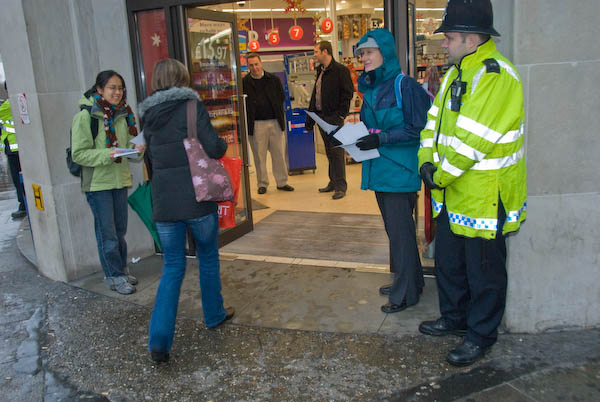If you are a photographer and work in Iraq, you run the risk of being imprisoned by the US military. The Committee to Protect Journalists claim that “dozens of journalists – mostly Iraqis – have been detained by US troops over the last three years.”
They get arrested for photographing or filming things that the US army would prefer not to be recorded. Those we know about were mainly working for major foreign agencies such as Reuters and Agence France-Presse, although I wonder if in fact we only know about these people because they were employed by the agencies. Are there many more we don’t know of?
Most get released without charge after a few days or weeks, but the site lists eight cases of more prolonged detention of up to a year. The details of each case ends with the statement: “Charges Substantiated: None”
Of course the best known case is that of Associated Press photographer Bilal Hussein, who has been held for almost 20 months. I’ve previously written about him here (and elsewhere,) and linked to the campaign to free him, urging others to join in the petition to free him.
His case at last came to the Central Criminal Court of Iraq yesterday, 9 Dec 2007, but the magistrate issued an order that everything should be kept secret, so the AP report can only report the bare facts. Although Hussein and his lawyer were allowed to see some of the material presented to the court, they were not allowed to take copies to use to prepare his defence, and no actual charges were made.
Hussein and his lawyer have also not been allowed to talk privately in order to plan a defence; their meetings have been held with a US soldier and military interpreter present.
It is now up to the Iraqi magistrate to decide whether there is any case to answer – and if so, it will be dealt with by a panel of three judges. It isn’t clear how long this will take, and certainly at the moment there are grave doubts about whether if the case does come to trial Hussein and his lawyers will be given the opportunity to prepare a proper defence so that he can get a fair trial.
Here in the UK of course we do things differently, although perhaps not so differently if you read the time-line of the SOCPA antics by police and courts as published on Indymedia. It is news and I think important news that has hardly been covered by the mainstream press.
One thing that gives photographers (and videographers) covering events such as these on our streets a little – if limited – protection is the UK Press Card. It isn’t perfect, but it does at least sometimes mean that photographers will get treated as reporters rather than as protesters. This Saturday, photographing a picket at Tesco Metro in Lower Regent Street, I would quite likely have been arrested for refusing to go into a pen when told to do so by a police officer if I hadn’t been able to show my card.

Picket against Tesco support for bio-fuels, London, Dec 8, 2007
Strangely enough, most of the times when I’ve really needed a press card have been at small events – like that picket – where the mainstream press aren’t interested and none of the photographers working for them cover.
I photograph them – as do others – because we think it important in terms of freedom of the individual, freedom of expression and a genuinely free press that such things should be recorded and published – even if only non-commercial media – such as Indymedia – are prepared to do so. Most of us also make some money out of such pictures through their use in small publications and as stock. Not a great deal, but with luck enough to make ends meet, at least along with the occasional more lucrative jobs.
Some news photographers are scheming to severely limit the issue of press cards, basically to guys like them working more or less full-time for the big newspapers. It is a change the police would welcome as making their job considerably easier, but which would severely curtail the wider freedom of the press.
Peter Marshall